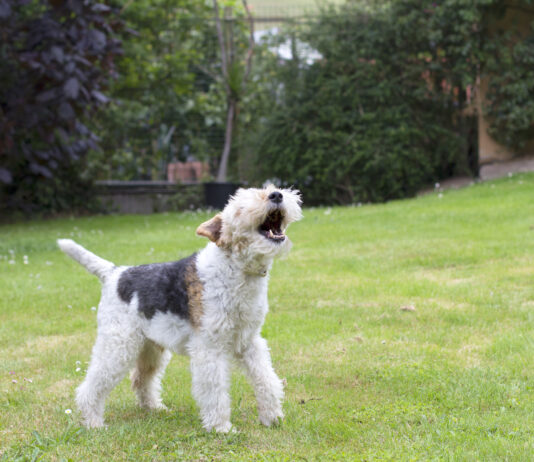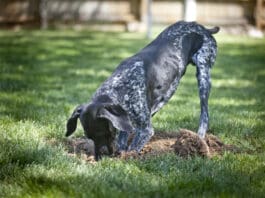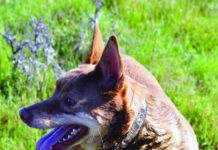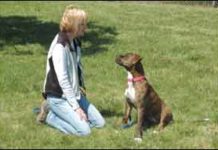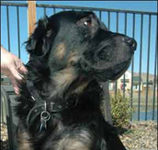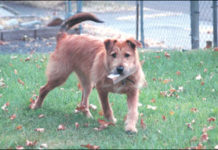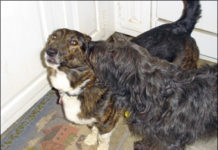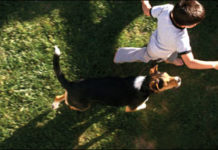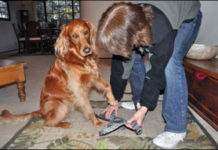Help Your Dog Learn Self Control
so the behavior never gets rewarded or reinforced.üDoes your dog jump
How to Catch a Dog on the Loose
but most will send an officer right away if the dog is contained."
How to Deal with a Dog Who Eats Poop
Most of us find a dog's habit of eating feces to be the most disgusting thing that a dog can do. The clinical name for this behavior is coprophagy (pronounced kä - prä - fey - je), from the Greek words copro, which means feces, and phagy, which means eat. The habit is not just revolting to us humans, it's also potentially harmful to the dog's health.
Teaching Your Dog Calm, Slow Breathing
Radio talk show psychologist Dr. Joy Browne offers her listeners a stress-reducing “Square Breathing” technique. To relax before or during any potentially anxiety-producing experience, try square breathing: Inhale to the count of four, hold to the count of four, exhale to the count of four, and hold for four. With practice, you can increase each side of the “square” to a count of eight or even 20; the longer the count, the slower and more calming the breathing.
What Is Autism?
The term Autism Spectrum Disorders (ASDs) describes a group of complex developmental brain disorders whose symptoms may appear in infancy or later in childhood, affecting speech and behavior. ASDs affects an estimated one out of every 110 children, with boys outnumbering girls three or four to one. In the United States, an estimated one out of every 70 boys is diagnosed with autism.
Taking More Steps To a Calm Dog
Every behavior and training professional has seen her share of WCCS dogs. Some have developed their own programs to help humans help their dogs.
Training a High-Energy Dog to Calm Down
and now offers a calm sit or down when he wants something
Behavior Modification for Itchy Dogs
Excessive self-licking and chewing can be caused by a medical issue. It can also be a behavioral problem, a classic example of an obsessive/compulsive disorder. Either way, it's annoying to the dog's human companion, and dangerous to the health of the dog. Here are tips for dealing with dogs who self-lick and chew excessively. To begin behavior modification, determine your dog's stressors and start eliminating them. Make a list of everything?you can think that is stresses your dog even just a little bit, even if the stressors don't seem directly related to the licking. Your list might include thunder, small children, dogs on television, cats, riding in cars, visits to the vet, shock collars, medical issues, and many more. Most owners can identify between 10 and 20 stressors for their dogs.
5 Things to Do the Next Time Your Dog Grabs Your Stuff and Runs
Your dog grabs your stuff and runs away either because she knows you're going to take it from her and she doesn't want you to, or she's inviting you to join in her a fun game of Catch me if you can." In either case
Obsessive Compulsive Behavior in Dogs
Owners of herding and sporting breeds Border Collies, Aussies, Kelpies, Labradors, Goldens, and others often cheerfully talk about their dogs' obsession" with tennis balls. What they really mean is that their dogs are very reinforced by the opportunity to chase a ball. That kind of intense interest in a ball or toy can be useful for training and management purposes
How To Stop the Dog from Chasing Children
Dogs and kids can be the best of playmates. Sometimes they develop this relationship all on their own, and sometimes they need some outside assistance to become fast friends. It's not uncommon for the basic dog-kid foundation to be solid, with just a few rough edges that need smoothing. One of the common rough spots is when your excited dog wants to chase after and nip your excited children. Here are five things you can do if your canine youngster wants to play a little too roughly with your human youngsters.
Walking An Excited Dog
You contemplate taking your dog for a walk with mixed emotions. You love the idea of going for a companionable stroll through the neighborhood together, but it's a major hassle to get out the door. When you pick up his leash he becomes the Tasmanian Devil body slamming you, racing around the foyer, and bouncing off the plate glass door with such intensity you're afraid he'll crash right through it.


